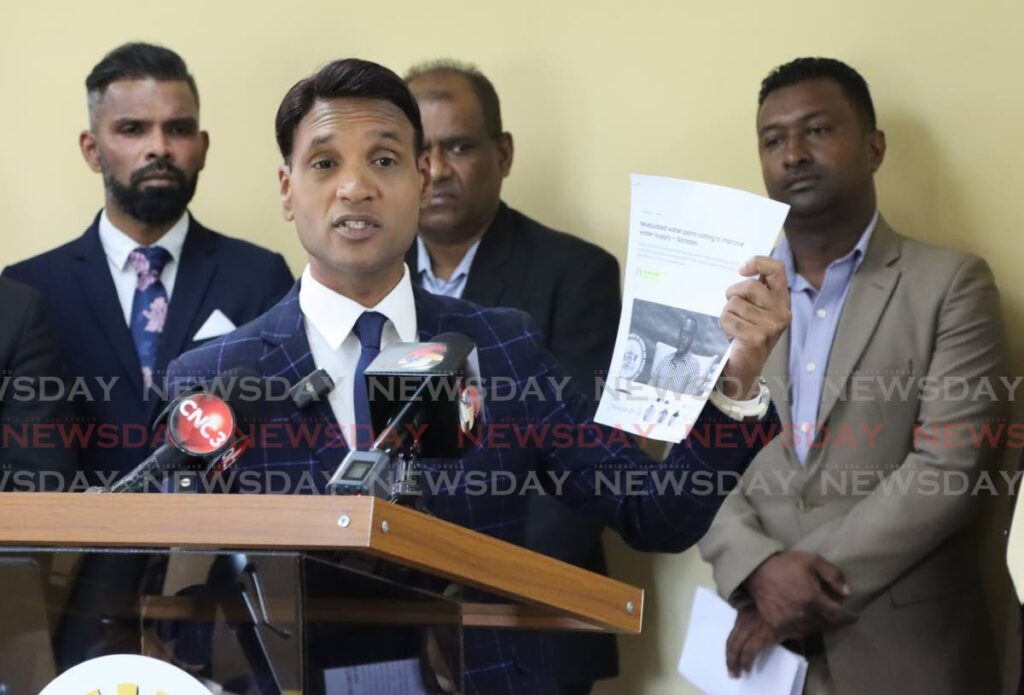UNC: Water crisis in opposition constituencies

DENYING they are playing "water politics" when there is a real water crisis, Opposition members say the situation has reached to the point where it is now affecting the country’s revenue stream.
Newly elected chairman of the Couva/Tabaquite/Talparo Regional Corporation Ryan Rampersad said the water crisis was affecting commerce in his area, which is home to the Point Lisas Industrial Estate.
Rampersad said many businesses on the Plipdeco estate and in the Couva districts had indicated plans to shut down temporarily if the water problems persist.
Already, he said, the Aquatic Centre has been closed, pointing out the facility was used by athletes from cold climates who came to Trinidad and Tobago to train.
He said it was a source not only of revenue, but foreign exchange that is being lost.
Rampersad said CTTRC was home to 178,000 people who were without water. Even though some people were willing to pay between $800 and $1,000 for a tank of water, they could not get it, as poor infrastructure prevented access to their homes.
Five opposition MPs, along with chairmen and mayors of the seven UNC-controlled regional corporations, held a news conference on Tuesday afternoon to address the water crisis, mainly in central and south Trinidad.
Couva South MP Rudranath Indarsingh said people, mainly in the UNC-represented constituencies, had reached frustration levels to the extent that he predicted future water riots, the likes of which were seen back in 1903.
Siparia Borough mayor Doodnath Mayrhoo, who has become wellknown for leading protests, promised if the situation was not rectified by the end of this week, he would be taking the "fire" to Port of Spain, “to raise the temperature.”
Public Utilities Minister Marvin Gonzales did not respond to a telephone call or a text message on Tuesday, but in an earlier interview said an electrical problem which caused the shutdown of the desalination plant and water woes for over 250,000 residents would be resolved.
He said the plant was 90 per cent operational and within the next 24 to 48 hours there should be some normality in supply. He said water would have returned to some affected areas.
At the UNC's media conference, Princes Town MP Barry Padarath said water had not been restored to any of the opposition-controlled constituencies.
All opposition members agreed with Padarath that the "dry-tap syndrome" in UNC constituencies was not new and did not start with the desalination plant shutdown over the weekend, but had been a perennial problem under the PNM administration.
Padarath said while the PNM had held political power longer than any other administration, it was under the Basdeo Panday and Kamla Persad-Bissessar administrations that TT experienced a 70 per cent water supply. He claimed supply was currently at 16 per cent.
He blamed a lack of vision, incompetence and poor planning, while insisting the Water and Sewerage Authority (WASA) was being deliberately under-resourced to justify Government’s planned restructuring of the company.
Mayaro/Rio Claro Regional Corporation chairman Raymond Cozier said he had to make the difficult decision which one of the critical institutions to leave out of the corporation's limited water distribution on a daily basis.
“Should I leave out the dialysis centre, or the health centre, the kindergarten or the parents who have children to go to school?
"It is a difficult choice I must make daily.
"The people in Guyaguayare must also wait until BP is adequately resourced with water before it is distributed in the various communities.
Cozier said there had been a return of barrels on the road in front of people’s homes to collect water from passing water trucks.
Kenwyn Phillip, Sangre Grande chairman, said the PNM government has also signalled the return of the outdated "barrel-by-the road syndrome" in his region.

Comments
"UNC: Water crisis in opposition constituencies"